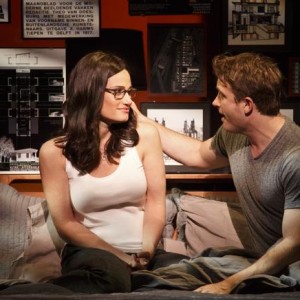“If/Then” review: Musical showcases Idina Menzel’s vocals amid a confusing narrative

Everyone can relate to the premise of “If/Then,” the musical about ambivalence and roads not taken. The question for theater-goers is, what do you seek from this show? If you want to thrill to the stunning vocal power of Idina Menzel, then this is a must-see. If you hope for a coherent story that is more than a star vehicle, then “If/Then” is a disappointment.
Menzel the modern Merman blows the roof off the Buell and delivers beautifully modulated vocal numbers throughout, but good luck following the narrative, an exercise in experimental storytelling that doesn’t quite connect.
As a rare treat, the musical starting its national tour in Denver boasts four members of the original Broadway cast: Menzel (Tony nominated for the role of Elizabeth), LaChanze (Tony Award winner for “The Color Purple”), Anthony Rapp (veteran of “Rent” with Menzel) and James Snyder. Each voice is exquisitely emotionally charged; all but Menzel demonstrate acting and dancing chops as well.
Menzel is a wonder, reaching full Elphaba in her “Always Starting Over” number. Note that this isn’t a show for kids, no matter how much they love “Frozen” and “Wicked.” “If/Then” is closer in texture to “Rent,” including “adult” language.
LaChanze contributes pure, expressive vocals as the lesbian best friend Kate. Snyder is a rich-voiced romantic as Josh. And Rapp gives depth to the role of Lucas, by turns comic and melancholy.
The story of a woman at midlife, newly divorced and returning to New York to weigh diverging paths to her future, “If/Then” is Brian Yorkey and Tom Kitt’s followup to their 2010 Pulitzer Prize-winning “Next to Normal.”
The show was retooled en route to Broadway, to help the audience follow the challenging alternate scenarios. Still, the show about doubts and confusion doles out too much of same. It’s a lengthy evening in which the narrative back-and-forth takes too much work.
Under Michael Greif’s direction, with choreography by Larry Keigwin, the action is divided into different strands following Elizabeth’s (Menzel) alternate life courses, as Liz and Beth. Red lighting helps the audience track Liz’s storyline; blue lighting helps distinguish Beth’s. Menzel takes glasses on and off to indicate the shifting roles. By the second act, it’s easier to give up on the mental flow chart and just enjoy the songs, 12 of which arrive in quick order, reiterating the same modern angst.
The spare, clever set is a highlight, conjuring the New York subway and a map of the city, with intersecting spaces and a rotating floor suggesting movement through time and alternate choices.
Ultimately, the vocals are the point; acknowledge the structural problems and let it go.